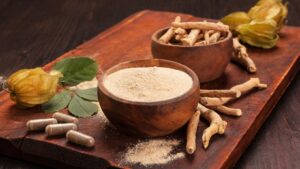|
Getting your Trinity Audio player ready...
|
From Anxious to Zen: Natural Supplements for Stress Relief
In today’s fast-paced world, stress has become an almost constant companion for many. While traditional methods like exercise, meditation, and therapy are well-known avenues for stress management, there’s growing interest in natural supplements that may offer additional support. One area gaining attention is the connection between gut health and stress. Emerging research suggests that a healthy gut can play a pivotal role in managing stress and anxiety. In this article, we’ll explore various natural supplements that not only aid in stress reduction but also promote optimal gut health.
Table of Contents
ToggleUnderstanding the Gut-Brain Connection
The gut and brain are intricately linked through a communication network known as the gut-brain axis. This bidirectional pathway allows the central nervous system and the enteric nervous system to communicate, influencing both emotional and gastrointestinal functions. A balanced gut microbiome—the community of microorganisms residing in our intestines—plays a crucial role in this interaction. Imbalances in gut bacteria have been associated with increased stress and anxiety levels. Learn more about Connection between Gut Health and Mental Health
Natural Supplements for Managing Stress and Supporting Gut Health
1. Probiotics

Role in Stress Management:
Probiotics are live beneficial bacteria that, when consumed in adequate amounts, can confer health benefits. They help maintain a healthy gut microbiome, which is essential for optimal gut-brain communication. Certain probiotic strains have been shown to reduce symptoms of anxiety and depression by modulating the gut-brain axis.
Recommended Strains:
- Lactobacillus rhamnosus: Known for its potential to reduce anxiety-like behavior.
- Bifidobacterium longum: May help alleviate stress and improve mood.
Sources:
- Fermented foods like yogurt, kefir, sauerkraut, and kimchi.
- Probiotic supplements containing specific strains.
2. Prebiotics

Role in Stress Management:
Prebiotics are non-digestible fibers that serve as food for beneficial gut bacteria. By nourishing these bacteria, prebiotics help maintain a balanced gut microbiome, which can positively influence stress levels.
Common Prebiotics:
- Inulin: Found in chicory root, garlic, and onions.
- Fructooligosaccharides (FOS): Present in bananas, asparagus, and leeks.
Sources:
- High-fiber foods such as whole grains, legumes, fruits, and vegetables.
- Prebiotic supplements.
3. Omega-3 Fatty Acids

Role in Stress Management:
Omega-3 fatty acids, particularly eicosapentaenoic acid (EPA) and docosahexaenoic acid (DHA), are essential fats known for their anti-inflammatory properties. They play a significant role in brain health and have been linked to reduced symptoms of depression and anxiety.
Sources:
- Fatty fish like salmon, mackerel, and sardines.
- Flaxseeds, chia seeds, and walnuts.
- Fish oil or algal oil supplements.
4. L-Theanine

Role in Stress Management:
L-Theanine is an amino acid predominantly found in tea leaves, especially green tea. It promotes relaxation without causing drowsiness by influencing brain wave activity and increasing the production of calming neurotransmitters.
Sources:
- Green and black tea.
- L-Theanine supplements.
5. Magnesium

Role in Stress Management:
Magnesium is a vital mineral involved in numerous bodily functions, including nerve transmission and muscle relaxation. Research suggests that magnesium deficiency may be linked to increased anxiety levels. Supplementing with magnesium can help regulate neurotransmitters and reduce symptoms of anxiety.
Sources:
- Leafy green vegetables, nuts, seeds, and whole grains.
- Magnesium supplements, such as magnesium glycinate or citrate.
6. Ashwagandha

Role in Stress Management:
Ashwagandha is an adaptogenic herb traditionally used in Ayurvedic medicine. Studies have indicated that ashwagandha can reduce cortisol levels, the body’s primary stress hormone, thereby alleviating stress and anxiety.
Sources:
- Ashwagandha root powder or capsules.
7. Ginger

Role in Stress Management:
Ginger has been recognized for its digestive benefits, including reducing inflammation, nausea, and improving gastrointestinal symptoms. By promoting a healthy digestive system, ginger indirectly supports stress management.
Sources:
- Fresh ginger root used in cooking or teas.
- Ginger supplements or extracts.
Incorporating Supplements into Your Routine
Before adding any new supplement to your regimen, it’s essential to consult with a healthcare professional to ensure it’s appropriate for your individual health needs. Additionally, consider the following tips:
- Start Slowly: Introduce one supplement at a time to monitor its effects.
- Quality Matters: Choose high-quality supplements from reputable brands.
- Lifestyle Integration: Combine supplementation with other stress-management techniques, such as exercise, meditation, and a balanced diet.
Conclusion
Managing stress is a multifaceted endeavor that involves a combination of lifestyle practices and, when appropriate, supplementation. By focusing on gut health through the use of probiotics, prebiotics, and other supportive supplements, you can positively influence your stress levels and overall


